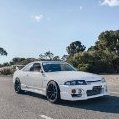Dumb Question
Announcements
-
Similar Content
-
Latest Posts
-
By TurboTapin · Posted
It's unfortunate what Tomei USA has done to Tomei's name in general. I'm very weary of ordering parts from them now. I only order direct from a Japanse source (e.g Nengun). At least their logos are different, so you end up knowing what you have. -
Update Issues 5 (plus #4) - 10 After making a claim about issue #4's missing part, DeAgostini Japan sent a whole new issue #4 and it arrived about 2 weeks after that. That was back in early March. It took another 4 weeks to receive issues 5 - 13 though. This update is for issues 5 - 10. Ove the 5 issues the front left suspension and most of the engine have been completed. The quality of the castings and fit of the parts is quite good, it seems better than DeAgostini's BNR34 Skyline GT-R from the Fast & Furious 2 movie, which (to me anyway) doesn't seem to have as tight tolerances or quite as accurate castings. Each issue has a lot of info about the 1989 - 1993 Skyline range and other Nissan models from that era, but the focus is on the BNR32 Skyline GT-R Nismo and the various racing it did in Japan, Europe (Spa 24hrs) and of course Australia. I've included some text translated with Google Lens in some photos and will add to them if there's anything worth including.
-
By Dose Pipe Sutututu · Posted
If it's for a SR20, make sure it's not the American Poncams, might as well call them Poocams. Had a set in a friend's car, all scuffed up after a few track days. Like the metallurgy Tomei USA used is junk. Went back to JDM OG Tomei Poncams, no issues till now. Tomei USA is not the real OG Tomei. Random rant over, fk the US of A, bunch of c u n t s. -
By TurboTapin · Posted
Most of the industry in North America either runs on Siemens or Allen Bradley. I have two redundant S7-1500's on my desk right next to me for simulation. Siemens has been losing ground though since Stuxnet, as cybersecurity is a big thing. In my line of work that is federally regulated, you must by law have a cybersecurity management program in place and its audited and inspected every so often. I work with Emerson PLC's daily (RX3i's) and have done large biogas/refinery projects with their DCS's. Their PLC's are somewhat OK minus the way they do PLC redundancy (You have to download on both PLC's separately every time you make a change ) As for their DCS's... you'll be limited financially first before anything else stops you. Costs are exorbiant at roughly 10x what it would cost you to do with any other system (e.g AB PAC). 1990's, those suckers are brand new haha! Kraft-Heinz (An old client when I use to work for an ESP) still runs Siemens TI505 PLC's from the mid 80's. Ohh how I don't miss working with those... you could only do a certain number of online downloads until it's "Change" buffer would be full and you would then need to go offline to do a full download. There was no warning of when this was coming up and it generally would happen when you would go in at 2am to make changes before production -_-.
-









Recommended Posts
Create an account or sign in to comment
You need to be a member in order to leave a comment
Create an account
Sign up for a new account in our community. It's easy!
Register a new accountSign in
Already have an account? Sign in here.
Sign In Now